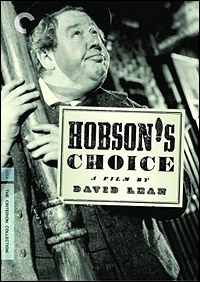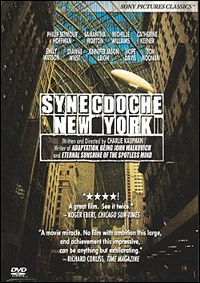
*
Around about the middle of the last century, the Ealing Studios in West London made a series of dark comedies featuring the relatively new film actor Alec Guinness. Four of them are classics in their field, and capital fun as well. They have just now been packaged by Lionsgate (with a non-Ealing title added) into what they call the Alec Guinness 5-Film Collection. These Guinness classics have long been available, and were released back in 2002 in a similar five-film box. (Not having the earlier "Alec Guinness Collection" at hand, it is impossible to say whether these are identical masterings.)
The first of the lot, and the best, and the film that established Guinness — who had thus far been seen on screen in David Lean's "Great Expectations" and "Oliver Twist" — as a comic genius was Robert Hamer's "Kind Hearts and Coronets" (1949). This is the film in which a likable young fellow seeks to inherit his ancestral title by bumping off various well-connected relatives from their perches in the family tree. Guinness does not play the nominal lead; that is Dennis Price, who is pretty good though this would be the highlight of his career. Guinness, with fourth star billing, plays the eight relatives — each more eccentric than the next.
This films has also been released in a superior restoration as part of the Criterion Collection, with a second disc of bonuses — but without the other four Guinness films in this Lionsgate set.
1951 saw two wonderful Guinness-Ealing films. Michael Crichton's "The Lavender Hill Mob" is a bank heist gone awry, with Guinness and Stanley Holloway — soon to create Alfred P. Doolittle in Lerner & Loewe's My Fair Lady — as a pair of unlikely masterminds whose scheme prominently features British schoolgirls and the Eiffel Tower. Keep your eyes open early on and you'll see a delectable slip of a thing called Chiquita, who within a couple of years turned into Audrey Hepburn. That same year brought forth Alexander Mackendrick's "The Man in the White Suit." Guinness is an eccentric chemist who invents an indestructible fiber that never wrinkles or gets dirty. Which leads to his downfall, as the mill owners realize that this miracle cloth — if manufactured for sale — would eventually drive them all out of business. A provocative and somewhat overlooked comedy of ideas, with increased relevance today. Anthony Kimmins' "The Captain's Paradise" (1953) is the non-Ealing film of the group, and one I've never quite cottoned to. Captain Henry St. James has a ferryboat, a wife in Gibraltar, and another in Tangiers. For me, it promises more than it delivers. It was unsuccessfully musicalized in 1958, with the locales switched to London and Paris, as the Broadway musical Oh! Captain! starring Tony Randall. The final film of the group is another true winner, Mackendrick's "The Ladykillers." This black comedy about a gang of crooks — led by Guinness, supported by the rising Peter Sellers — also features Katie Johnson as a little old lady who might well drive you to murder, too.
Viewers who have the 2002 set or individual copies of these films presumably don't need this new box from Lionsgate. People who don't know these films, though, are in for a grand treat. Or rather, four of them.
*
 |
Lean's Hobson's Choice [Criterion], in a new high-definition transfer from the restoration by the BFI National Archive, is absolutely stunning. One need only look at the rainwater on the cobblestones; Lean brings the world, in this case black-and-white Salford (a suburb of Manchester) circa 1880, vibrantly alive. He also had the good sense to cast the film with three perfect actors. Charles Laughton is monumental, in several meanings of the word. Watch him, in his very first scene, climb the stairs. That's all you need, man climbs stairs. Lean has him fill the screen — Laughton in widescreen is quite something — and the effect is monstrous, ghastly, wondrous. Watch as Charles is forced to eat a slice of wedding cake. As they used to say, what a kisser!
John Mills, too, provides a remarkable characterization as Will Mossop, master bootmaker. He starts out as what you might call an overgrown ragamuffin; his hair sticks out in so many directions that you wonder how they were able to recreate it, day-after-day, during the filming. (He recreated the coiffure, somewhat, many years later for Lean's "Ryan's Daughter" — which nabbed Mills an Oscar.) But the thrill of the performance is watching this Mossop's mind grow as he discovers a world he never knew existed. In the early scenes Mills is wide-eyed and innocent, jerked about like a marionette on strings; "By gum!" is his interjection of choice. At film's end, he is very much in control of his life and his wife. Watch as he scurries after Miss Maggie, on her way to disengage him from his landlady's scullery-maid daughter. Watch as he stands at church, awaiting his new bride; Lean has him lean over to read the inscription on a tombstone, with Mills jackknifed at a 90-degree angle. Observe him, then, getting undressed after his wedding dinner, carefully balancing his collar and cuffs beside the gas jet on the mantle; in a matter of moments, fright and embarrassment turn to resolve and determination. Fast forward to Mills surveying the stock at Hobson's; he is now the master, all right.
The two men are matched by Brenda de Banzie as Maggie, who settles on the lowly Mossop to avoid impending spinsterhood. De Banzie is relatively unknown; her other major roles were as Olivier's wife, on stage and screen, in John Osbourne's "The Entertainer" (which nabbed her a Tony nomination in 1958), and as the chilling villainess in the 1956 James Stewart-Doris Day remake of Alfred Hitchcock's "The Man Who Knew Too Much." Hers is a controlling presence here, handily combating Laughton's scene-stealing and Mills' artistry. There's a scene near the end of the film, where Hobson's other daughters are putting their proverbial feet in their mouths, more or less, and cutting themselves out of their inheritances (in a rather humorous recasting of King Lear). De Banzie is on the corner of the screen, merely observing Laughton and his other two daughters. As each of the girls sabotages herself, Brenda makes the slyest, subtlest sidelong glance at Will (who is not in the shot); Maggie is silent here, almost crowded out of the shot, but De Banzie is who we are watching.
And let us have a few words for composer Malcolm Arnold. All I can tell you is that when I first saw this film, back in the days before cable and DVD and VHS — when you had to catch a movie when it was on one of the eight or so channels of your television set — I actually grabbed a cassette recorder and held it up to the screen so that I could preserve Arnold's soundtrack. His title music is jubilant and boisterous, sprightly and humorous; a walking, laughing theme that remains a favorite piece of music. Arnold also wrote fine scores for films like "Captain's Paradise" and "Bridge over the River Kwai" (which nabbed him an Oscar); but his "Hobson's Choice" themes always bring a huge smile and memories of that rainy suburban cobblestone street.
 |
"Synecdoche" is brilliant, I suppose, but also frustrating; it makes Kaufman's hauntingly memorable "Being John Malkovich" seem positively simplistic. As for acting, Mr. Hoffman gives an absolutely wrenching performance. I can't say that I enjoyed "Synecdoche, New York"; I found it riveting yet uncomfortable, which I suppose was Kaufman's intention. Memorable, that's for sure.
*
Arriving moments before my deadline were two Disney DVDs of distinct interest. Rather than wait till next month to cover them, let me add a few quick words. Walt's own Pinocchio is familiar enough to readers of this column. At long last, this 1940 film — which immediately followed the 1937 "Snow White" both in chronology and, arguably, entertainment value — has been given the treatment it deserves. The review copy contained the two-disc Blu-Ray release along with a DVD of the feature only. [Note to self: time to get a Blu-ray player. . . .] The DVD looks so good that one can only imagine how the Blu-Ray came out. The bonuses sound extra-special, including a "making of" piece, games, and story boards of deleted scenes and the alternate ending. All this plus Jiminy Cricket singing Leigh Harline and Ned Washington's Oscar-winner "When You Wish upon a Star" plus "Give a Little Whistle."
And then there's High School Musical 3: Senior Year, which takes the now-superstar cast through — well, senior year. The third entry in the franchise is bigger and better than the first two, at least technically so; the others were TV movies, but this is a full-scale, big budget feature (with receipts north of $90 million, thank you very much). Those that loved the first two DVDs will no doubt appreciate #3 even more; those who didn't will be even less lenient. But this franchise is a major cultural phenomenon, and I suppose a whole generation will come of age with Troy, Gabriella, Sharpay and Ryan as common denominators. (Way too common?) At any rate, don't overlook director/choreographer/producer Kenny Ortega, whose ball of wax the whole thing is and who deserves every bit of success for getting said generation to concentrate on something really important, namely the annual school musical. Disney, which knows the habits and desires of its customers, has outfitted HSM3 with all sorts of bonuses, several of which are on Blu-Ray only. (Steven Suskin is author of "The Sound of Broadway Music: A Book of Orchestrators and Orchestrations" as well as "Second Act Trouble," "Show Tunes" and the "Opening Night on Broadway" books. He can be reached at [email protected])











